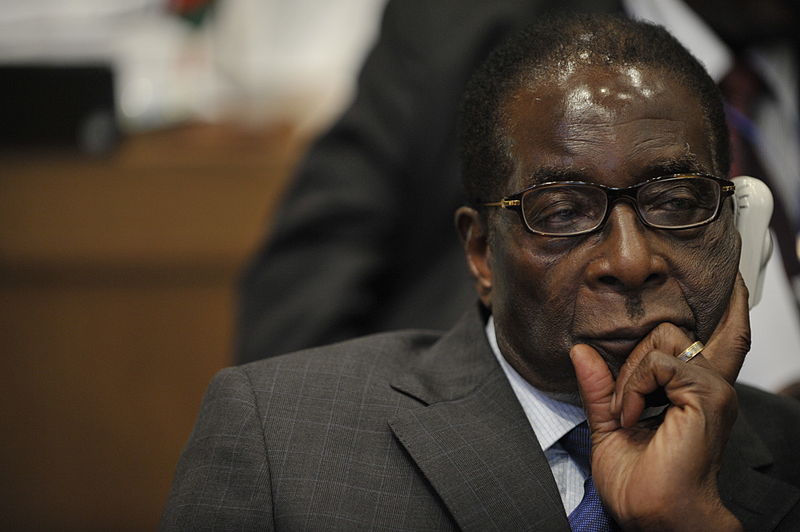 Australia’s reaction to the conduct of the Zimbabwean election (31 July), in which President Mugabe was victorious, reportedly gaining 61% of the vote, was resolute. On 4 August, Foreign Affairs Minister Bob Carr said:
Australia’s reaction to the conduct of the Zimbabwean election (31 July), in which President Mugabe was victorious, reportedly gaining 61% of the vote, was resolute. On 4 August, Foreign Affairs Minister Bob Carr said:
Australia has been a strong supporter of the people of Zimbabwe and we follow developments closely….Given our doubts about the results, Australia calls for a re-run of the elections based on a verified and agreed voters roll.
It’s commendable that Australia has taken a strong stance. Interestingly, Prime Minister Kevin Rudd and Deputy Opposition Leader Julie Bishop both previously participated in an election monitoring delegation to Zimbabwe.
Disappointingly, African institutions haven’t taken a similarly strong stance. The head of the African Union mission declared the elections ‘fairly fair’ and leading member of the Southern African Development Community (SADC), President Zuma, congratulated Mugabe and encouraged acceptance of the result.
The African continent has many instances of tyranny, but the situation in Zimbabwe is an especially depressing one. The most apt way of describing the tactics used by Mugabe and his ZANU-PF party over the years is ‘attrition warfare’—a slow wearing down of their opponents and a crushing of their spirit, all done with a confidence that no matter how bad the situation gets, Mugabe will prevail, whatever the cost.
The opposition party, Movement for Democratic Change (MDC) have dropped their legal challenge of Mugabe’s re-election, explaining they won’t get a fair hearing. It’s widely recognised that Mugabe controls the courts. The Zimbabwe case represents the lack of commitment amongst political elites in the Southern African region for democracy and human rights; reportedly SADC is planning to appoint Mugabe as its next Chairperson and hold their next meeting in Zimbabwe.
Back in 1976, in the midst of the Rhodesian (Zimbabwe) war, Mugabe shared his views on electoral democracy:
Our votes must go together with our guns. After all, any vote we shall have, shall have been the product of the gun. The gun which produces the vote should remain its security officer – its guarantor. The people’s votes and the people’s guns are always inseparable twins.
It’s clear that Mugabe has maintained this mantra throughout his 33-year reign over Zimbabwe. In effect, Zimbabwean history illustrates the tragic pattern of so many African states, with the replacement of a repressive white minority government with a repressive black minority government. Soon after gaining political power in 1980, Mugabe set about consolidating his power base and annihilating any dissent to his rule. In the 1980s, in rural Ndebele areas, he unleashed a brutal campaign of terror, which reportedly caused the death of between 20,000 to 30,000 people.
So, what next for Zimbabwe and how should Australia react? Mugabe’s main campaign message centred on ‘Indigenisation’ and ‘Black empowerment’ measures. The economic policies of ZANU-PF unnerve foreign investors; under indigenisation plans, foreign companies operating in Zimbabwe have to be 51% owned by Black Zimbabweans. ZANU-PF is reportedly keen to seize foreign mining companies and banks, and to establish a ‘Blacks-only Harare Stock Exchange’ by the end of the year.
These policies do have some support. Zimbabwean Sociologist Lennon Mhishi believes, in principle, that policies of indigenisation and empowerment have merit, in light of Zimbabwe’s colonial history and the need for redistributive justice. But the problem’s the way the policies have been implemented in recent years, which has only benefited a small political elite, with no real benefits accruing to the Zimbabwean population, and has severely damaged food productivity.
Zimbabwean political analyst Simukai Tinhu provides this analysis:
The indigenisation programme is likely to be pursued in the short term. In the long run the government is likely to modify or retreat altogether from this program. This is because of three reasons. First, the ZANU – PF stalwart who’s likely to succeed Mugabe in the next five years, Emmerson Mnangagwa, has been known to be an opponent of the indigenisation program. There’s very little consensus on what the policy means and how it should be pursued. Indeed, Mnangagwa is known to have said very little in support of the indigenisation programme. If he does succeed, he’s likely to reshuffle the cabinet, and probably appoint a cabinet minister who’s less enthusiastic about the program than the current minister, Saviour Kasukuwere.
Second, Mugabe’s win has already sent jitters amongst investors, the Zimbabwe Stock Exchange ‘plummeted’ after Mugabe’s re-election. The ZANU–PF government is aware that more investors are likely to pull out of Zimbabwe, plunging the country back into economic chaos that characterised the nation between 2000 and 2008.
Third, in an attempt to ‘buy off’ popular legitimacy, the government is likely to pursue progressive economic reforms that include re-establishing relations with international organisations such as IMF to access credit. They’re also likely to tone down their rhetoric on indigenisation as a precursor to abandoning the unsustainable policy in the future.
Nonetheless, there’s still plenty of scope for short-term hurt to Zimbabwe’s people and economy. Australia must maintain its strong stance on Zimbabwe and keep in place sanctions, including travel bans and financial measures against 33 individuals. According to Australia’s three-stage roadmap, these remaining measures were to be lifted once free and fair elections were held and a democratically elected government took office. Since in Australia’s view this hasn’t happened, the sanctions must remain.
Sabrina Joy Smith is a PhD candidate with the Centre for the Study of the Great Lakes Region of Africa at the Institute for Development Studies and Management, Belgium. She is currently based in New South Wales. Image courtesy of Wikimedia Commons.

